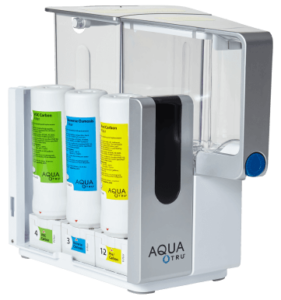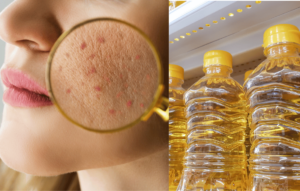“Is this invisible endocrine disruptor in the room with us right now?”
Well, when it comes to silent disruptors, the answer is… yes, they are. You can’t see them, but they’re here—affecting your energy, your health, and even your environment. Whether it’s the EMFs from your phone or the chemicals in your food, these invisible forces are doing more than just lurking—they’re actively messing with how your body functions.
And while they might not be obvious, the science is clear: these disruptors have real, measurable impacts. For some, they’re just a minor nuisance. But for others—especially those already vulnerable to autoimmune issues or chronic inflammation—they can weaken an already strained system.
1. Electromagnetic Fields (EMFs)
EMFs are a silent, yet ever-present disruptor in today’s world. From the Wi-Fi in your home to the smartphone in your pocket, electromagnetic radiation is constantly around us. While these technologies make life more convenient, they also interfere with your body’s natural processes, particularly your endocrine system. EMFs have been shown to reduce melatonin production, which can lead to poor sleep, increased stress, and even lowered testosterone levels. Over time, this disruption can lead to chronic fatigue, brain fog, and weakened recovery.
If you’ve been following my work, you’ll know I’ve covered EMFs extensively, including how they exacerbate oxidative stress and how they impact testosterone in athletes. If you’re looking for a solution, I recommend Aires Tech, whose products help reduce your exposure to these invisible disruptors.


Unwrapping the Controversy of Cell Phones in Education Globally

Cosmic Currents and Cable Wires – The EMF Nature-Tech Contrast
2. Blue and Artificial Light
We live in a world where natural light is often overshadowed by artificial sources. Whether it’s the blue light from your phone or the LED bulbs in your home, artificial light interferes with your circadian rhythm. Your body relies on natural light cycles to regulate melatonin production, and when these cycles are disrupted, your sleep quality suffers. Poor sleep doesn’t just leave you feeling tired—it affects everything from your metabolism to your immune system.
Beyond just sleep disruption, constant exposure to artificial light can lead to elevated cortisol levels, which, over time, result in weight gain, insulin resistance, and fatigue. To combat this, reduce screen time before bed and consider using blue-light-blocking glasses and buying low-flicker or no-flicker incandescent light bulbs.
3. Processed and Ultra-Processed Foods
Processed foods are easy, convenient, and everywhere. But they come with a hidden cost. These foods are loaded with endocrine disruptors like preservatives, artificial flavors, and toxic oils, which interfere with your body’s ability to regulate hormones like insulin and estrogen. Over time, this leads to chronic inflammation, insulin resistance, and weight gain.
Even foods marketed as “healthy” often contain chemicals like BPA, which mimics estrogen in the body, leading to hormonal imbalances that affect everything from mood to reproductive health. The key to avoiding these disruptors is to stick to whole, organic, and unprocessed foods. JERF (Just Eat Real Food) is the guiding principle I follow—organic, pasture-raised meats and pesticide-free produce should make up the majority of your diet. I’ve written about this extensively, and if you’re ready to dive deeper, check out my other articles on clean eating.
4. Mold
Mold is a hidden threat that can seriously impact your health without you even realizing it. Whether it’s in your home or office, mold releases spores that can trigger inflammatory responses, affect your respiratory system, and lead to a range of symptoms like fatigue, brain fog, and mood swings.
But mold doesn’t just affect your breathing—it’s a serious endocrine disruptor. Mold exposure can lead to adrenal fatigue by overstimulating your body’s stress response, and over time, it can interfere with thyroid function, slowing your metabolism and sapping your energy.
If you suspect mold is present in your environment, I recommend AirDoctor, an air purifier designed to eliminate mold spores and other airborne toxins. For more on this, check out my previous posts on mold detoxification and environmental toxins.
5. Heavy Metals
Heavy metals like mercury, lead, and aluminum are pervasive in our environment. Whether they come from contaminated food, personal care products, or even cookware, these metals accumulate in your tissues over time and disrupt your body’s hormonal balance. They interfere with the function of the thyroid and adrenal glands, leading to fatigue, cognitive issues, and slowed metabolism.

Heavy metals mimic essential minerals, making it harder for your body to produce hormones effectively. The result? A range of symptoms from brain fog to chronic fatigue. To minimize exposure, detox strategies are essential, and a high-quality water filter like AquaTru is a great way to reduce heavy metals in your drinking water. For more information on how heavy metals affect your health, check out my detailed posts on detox pathways and mineral balancing.
6. Synthetic Fragrances and Phthalates
Most people don’t think twice about the fragrances in their household products, but synthetic fragrances are loaded with chemicals known as phthalates. These chemicals act as xenoestrogens, mimicking estrogen in the body and throwing off your hormonal balance. Phthalates are found in everything from air fresheners and perfumes to cleaning products, and over time, they can lead to hormonal imbalances that affect mood, energy, and reproductive health.
Swapping synthetic products for natural alternatives is a small step that makes a big impact. You can always make your own too with simple ingredients such as sodium bicarbonate (baking soda), white vinegar, sodium citrate, etc.
7. Airborne Pathogens and Toxins
Airborne toxins and pathogens—from pollen and dust mites to volatile organic compounds (VOCs)—are invisible threats that silently disrupt your health. These toxins contribute to chronic inflammation, which in turn affects hormone regulation and weakens your immune response. They also interfere with cortisol production, which can lead to fatigue, brain fog, and long-term immune issues.

To keep your air clean, I recommend using an air purifier like AirDoctor, which removes up to 99% of airborne pathogens and toxins. Breathing clean air is one of the simplest ways to reduce inflammation and improve overall health. You can learn more about the role of airborne toxins in my posts on environmental health.
8. Plastics and Microplastics
Plastics are everywhere, from the packaging of your food to the water bottles you drink from. But what many people don’t realize is that these plastics break down into microplastics, which find their way into your body. Microplastics have been found in everything from drinking water to the food we eat, and they contain endocrine disruptors like BPA and phthalates that interfere with hormone production.
These microplastics act as xenoestrogens, mimicking hormones and leading to imbalances that affect everything from metabolism to reproductive health. Minimizing your exposure to plastic, particularly in food packaging, and switching to alternatives like glass or stainless steel can reduce your intake of these harmful chemicals. For more on how microplastics impact your health, see my detailed posts on detoxification and how to limit plastic use in everyday life.
9. Pesticides
Pesticides are one of the most common, yet overlooked, disruptors of our endocrine system. Even if you’re eating healthy fruits and vegetables, non-organic produce is often covered in pesticide residues that interfere with your hormones. These chemicals act as xenoestrogens, disrupting your natural hormonal balance and leading to weight gain, fertility issues, and even mood disorders.
Pesticides are also linked to thyroid dysfunction, insulin resistance, and metabolic disorders. The best way to avoid them? Choose organic whenever possible or grow your own. I’ve written extensively about the importance of organic, pesticide-free foods, and JERF (Just Eat Real Food) is a principle I follow and recommend.
10. Water Contaminants
It’s easy to think that tap water is safe, but in reality, it’s often loaded with endocrine disruptors like chlorine, fluoride, and heavy metals. These contaminants interfere with your thyroid, adrenal glands, and even reproductive hormones. Over time, exposure to these chemicals leads to hormonal imbalances that affect energy levels, weight gain, and even your immune response.
To protect yourself, I always recommend filtering your water with a system like AquaTru, which removes these contaminants and provides clean, safe drinking water. If you want to dive deeper into the topic of water contaminants, I’ve covered it extensively in my previous articles on water filtration and detox strategies.
Wrapping it Up
It’s easy to feel like we’re being bombarded from every angle—whether it’s EMFs, toxic chemicals, or plastics—but this isn’t about doom and gloom. The reason I write about these silent disruptors is not to create fear, but to raise awareness. When we understand what’s working against us, we can take control, altering our lifestyle to achieve healthier outcomes and making ourselves less vulnerable to these invisible threats.
By becoming more proactive and self-governed in the way we live, we can improve our own health and well-being, and as a result, we become better caretakers for our families and communities. It’s about living with intention and creating a life that allows us to be present, energetic, and resilient. Start with small steps—filter your water, improve your air quality, eat real food—and
you’ll quickly feel the benefits. You’re not powerless in this; you have the tools to combat these silent disruptors and thrive in a world full of them. Taking control of your environment and making intentional, healthier choices can lead to long-lasting benefits for both you and those you care about.











